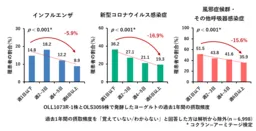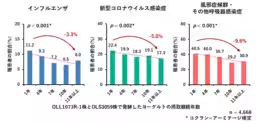

Recent Study Links Yogurt Consumption to Reduced Rates of Respiratory Infections
The Health Benefits of Yogurt: A New Observational Study
Recent findings presented at the 79th Annual Meeting of the Japanese Society of Nutrition and Food Science shed light on a promising connection between yogurt consumption and a reduction in respiratory infections. Conducted by Meiji Co., Ltd. and Meiji Holdings Co., Ltd., this significant observational study involved nearly 7,000 participants. The research specifically focused on yogurts fermented with the lactic acid bacteria Lactobacillus delbrueckii ssp. bulgaricus OLL1073R-1 and Streptococcus thermophilus OLS3059.
Key Findings
The study revealed that individuals who regularly consume yogurt made with OLL1073R-1 and OLS3059 strains report lower incidences of influenza, COVID-19, and other respiratory infections. Participants who had higher frequencies of yogurt consumption within a year were found to have a noticeably decreased likelihood of contracting these infections.
Furthermore, the research discovered that those who had maintained a long-term yogurt consumption habit experienced an even lower incidence of respiratory illness. This suggests not only an immediate benefit of yogurt consumption but also a cumulative advantage over time. Among participants, higher yogurt intake was also correlated with improvements in quality of life metrics. Lower levels of fatigue, stress, and feelings of depression were reported, as well as improved self-reported sleep quality.
Study Overview
To conduct this large-scale observational study, researchers distributed a web-based questionnaire to approximately 300,000 men and women aged 20 to 80 living in Japan. From the responses, they focused on 6,998 participants who had indicated that they habitually consumed yogurt made from the aforementioned strains at least four times a week throughout the previous month. Their history of yogurt intake was then analyzed concerning their rates of respiratory infections and their self-reported quality of life.
The analysis revealed compelling results; those consuming yogurt six or more times a week reported lower rates of respiratory infections. Specifically, individuals in this category had 5.9% lower instances of influenza infections, 16.9% lower cases of COVID-19, and 15.6% fewer incidences of cold-like symptoms compared to those consuming yogurt once a week or less. Additionally, a separate analysis indicated that individuals with longer yogurt consumption histories also exhibited lower rates of respiratory diseases.
Quality of Life Impact
Beyond the connection to respiratory illnesses, the study further explored how yogurt consumption affects overall well-being. Participants who consumed yogurt more frequently reported significantly lower levels of fatigue, stress, and depressive symptoms, as well as enhanced subjective sleep quality compared to those who consumed it three times a week or less. The benefits were visually represented in comparative studies, highlighting significant differences in health outcomes based on yogurt consumption habits.
Implications of the Study
As the world continues to combat ongoing threats such as influenza and COVID-19, these findings spotlight the potential of using yogurt as a functional food to bolster immune defense. Further research is planned to delve deeper into the infection-preventing effects associated with regular consumption of OLL1073R-1 and OLS3059 fermented yogurts.
Conclusion
These findings reinforce the potential role of yogurt in maintaining health by reducing the incidence of respiratory infections and enhancing quality of life indicators like stress and sleep quality. This research not only contributes to the body of scientific knowledge surrounding probiotics and health benefits but also offers consumers actionable insights to improve their dietary habits for better health outcomes.




Topics Health)










【About Using Articles】
You can freely use the title and article content by linking to the page where the article is posted.
※ Images cannot be used.
【About Links】
Links are free to use.